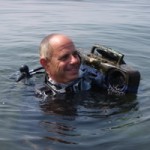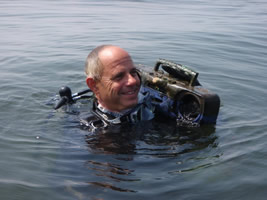 Aquaculture specialist Gregg Rivara has a certain affinity for Long Island. He grew up in Queens, received his Bachelor’s degree from Southampton College of Long Island University (now a satellite campus of Stony Brook) in 1982 and, soon after, began his Master’s degree at the Marine Science Research Center (now SoMAS). When he first arrived at MSRC, he had a research assistantship with Dr. Doug Capone and Dr. Ed Carpenter working with bacteria and microalgae, but Gregg’s true passion was shellfish. That’s when he connected with Dr. Robert Malouf, who helped Gregg receive a Sea Grant scholarship to pursue work with hard clams. His Master’s thesis examined how light and flow affect burrowing of very small, recently-set hard clams.
Aquaculture specialist Gregg Rivara has a certain affinity for Long Island. He grew up in Queens, received his Bachelor’s degree from Southampton College of Long Island University (now a satellite campus of Stony Brook) in 1982 and, soon after, began his Master’s degree at the Marine Science Research Center (now SoMAS). When he first arrived at MSRC, he had a research assistantship with Dr. Doug Capone and Dr. Ed Carpenter working with bacteria and microalgae, but Gregg’s true passion was shellfish. That’s when he connected with Dr. Robert Malouf, who helped Gregg receive a Sea Grant scholarship to pursue work with hard clams. His Master’s thesis examined how light and flow affect burrowing of very small, recently-set hard clams.While Gregg was finishing his thesis, a job became available as a grant-funded lab technician at MSRC, so he remained in the family for a few months after finishing in December of 1985. However, Gregg was getting ready to settle down and decided that he needed to find work that wasn’t based on “soft money”. He took his Civil Service test and, in 1986, was hired by the Town of Islip as a Bay Management Specialist. While there, he participated in a variety of tasks, including buoy placement, planting of adult clams in spawner sanctuaries and building a shellfish nursery system in East Islip, which later became the Town’s shellfish hatchery.
However, Gregg’s stay with Islip was a brief one. After less than a year, he signed on as an Aquaculture Specialist with Cornell Cooperative Extension of Suffolk County (CCE). Gregg, still with CCE, is now Director of the Suffolk County Marine Environmental Learning Center. The Center, located at Cedar Beach in Southold, New York – on the North Fork of Long Island – triples as a working shellfish hatchery, an operational base of bivalve and habitat restoration programs and an educational facility. On any given day, Gregg could deal with a very mixed menu of tasks, from tours, to problems keeping the Center’s boats afloat and running, to assisting prospective shellfish farmers with permitting, to planting shellfish as part of an environmental restoration project. Plus, when he runs out of cool things to do, there’s always the administrivia that comes with the job title, “Director”.
Gregg says his education on Long Island, especially at MSRC, helped him make connections that he still uses everyday on the job. “I still keep in touch with many fellow alumni as well as professors and team up with both for grant-funded projects to help my clientele solve problems and help their businesses grow.”




